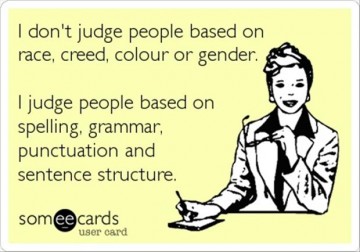Good grammar memes. We’ve all seen them peppering our social media feeds, mocking the slightly less literate (or, perhaps, simply the slightly less careful) with their affect vs. effect, grocer’s apostrophes, semicolons, and the Oxford comma. (Heh: see what I did there?)
 I’ll admit it — I usually love these memes. I know a little bit about grammar (and punctuation and spelling and usage…they really are distinct after all), and it bothers me when people get it wrong. But I’m quirky like that; I guess I just feel that if a thing is worth doing, then it’s worth doing well. If you’re going to write, you should endeavour to do it right.
I’ll admit it — I usually love these memes. I know a little bit about grammar (and punctuation and spelling and usage…they really are distinct after all), and it bothers me when people get it wrong. But I’m quirky like that; I guess I just feel that if a thing is worth doing, then it’s worth doing well. If you’re going to write, you should endeavour to do it right.
So when I see a funny grammar meme, it tends to make me feel smart and well-educated because I get it. I know the difference between less and fewer and I know that the Oxford comma is an optional comma after the word ‘and’ at the end of a list. (And in case you care, there’s no right or wrong; it’s kind of a love it or hate it thing.)
But there’s a part of me that wonders, do I like these memes for a less palatable reason? Do I — perhaps — like them because they make me feel superior? Probably. Come on now…be honest: don’t we all like to feel superior to the hoi polloi* from time to time?
British humourist Stephen Fry (whom I greatly admire) has an opinion on this sense of linguistic superiority; he calls it pedantry.
[youtube id=”J7E-aoXLZGY”]
Have I become a language pedant? I think it’s a worthwhile question. The ultimate goal of language is, after all, to communicate. If someone says, “irregardless of the weather, we’re going camping this weekend” is their meaning any less clear to me? No. I know very well that they mean they will go camping this weekend regardless of the weather. Does it really matter that they got it wrong?
If you’re going to write, you should endeavour to do it right.
Language is a living, organic thing that changes and evolves over time. For heaven’s sake: the word “selfie” was included in the Oxford English Dictionary (the Bible of English language geeks) this year!
For me it’s an ongoing an internal struggle. I know Stephen Fry is right. Our language is changing right before our very eyes and I don’t want to be the old fuddy-duddy waving my metaphorical cane at the linguistic rule-breakers of the world.
I don’t want to be a language pedant.
On the other hand, I can’t help mentally captioning this kickass scene from BBC’s Sherlock:
[youtube id=”gnlhKWeDWMA”]
SCHOOLED.
What about you? Where do you sit? Are you a rule-breaking writer with little regard for conventions or do you agonize over every hyphen and em-dash?
*I know the correct usage is ‘hoi polloi’ without the definite article ‘the’, but I think ‘the hoi polloi’ reads better, so there.

I’m with you in loving them and feeling like we should at least try to use our own language correctly, particularly in written form, which tends to be more formal – but I also agree that it can get a bit insufferable, particularly if you were to actually correct people in real life. So I chuckle at the memes and agree that I really am stupidly anal about the Oxford comma and always notice when they are missing, but I resist sharing them all and keep it inside my head around other people. Balance, or something like that. 😉
I’m with you, Alice. Would that we were all perfect in every sense, but sadly that isn’t so. And I remember being admonished with the old adage, “people in glass houses shouldn’t throw stones.” I am far from an expert, so I should probably just keep the judgements in my “inside voice”. 😉
omg…i am holmes! but mostly on the inside. but now i can use that awesome voice when i internally correct someone!
I love that show. It’s hilarious to watch, and I love his character, but Holmes IRL would be rather an insufferable prat, don’t you think?
Shouldn’t it be ” WHOM I admire”?
GAH, Sue, you’re right. Typo duly amended.
‘Who’ and ‘whom’ are relative pronouns (meaning they’re used to replace a specific noun, in this case: Stephen Fry). The correct formal usage is to use ‘whom’ to replace the object of a verb or preposition. In informal writing or speech, however, even the OED admits that using the relative pronoun ‘who’ to replace both subjects and objects is standard and acceptable.
But even this mini-discussion really just reinforces my point about that tension between the inner grammar-nazi in me and the lover of language as an organic and artful form of creative expression. Do I like to get things right? Yes, absolutely. And I’d like others to get it right more often than they usually do. Conversely: is it possible that we’ve gone a little overboard with the grammar superiority meme? I think many of us (myself included) are flirting with that line.
shouldn’t it be “WHOM I greatly admire”?